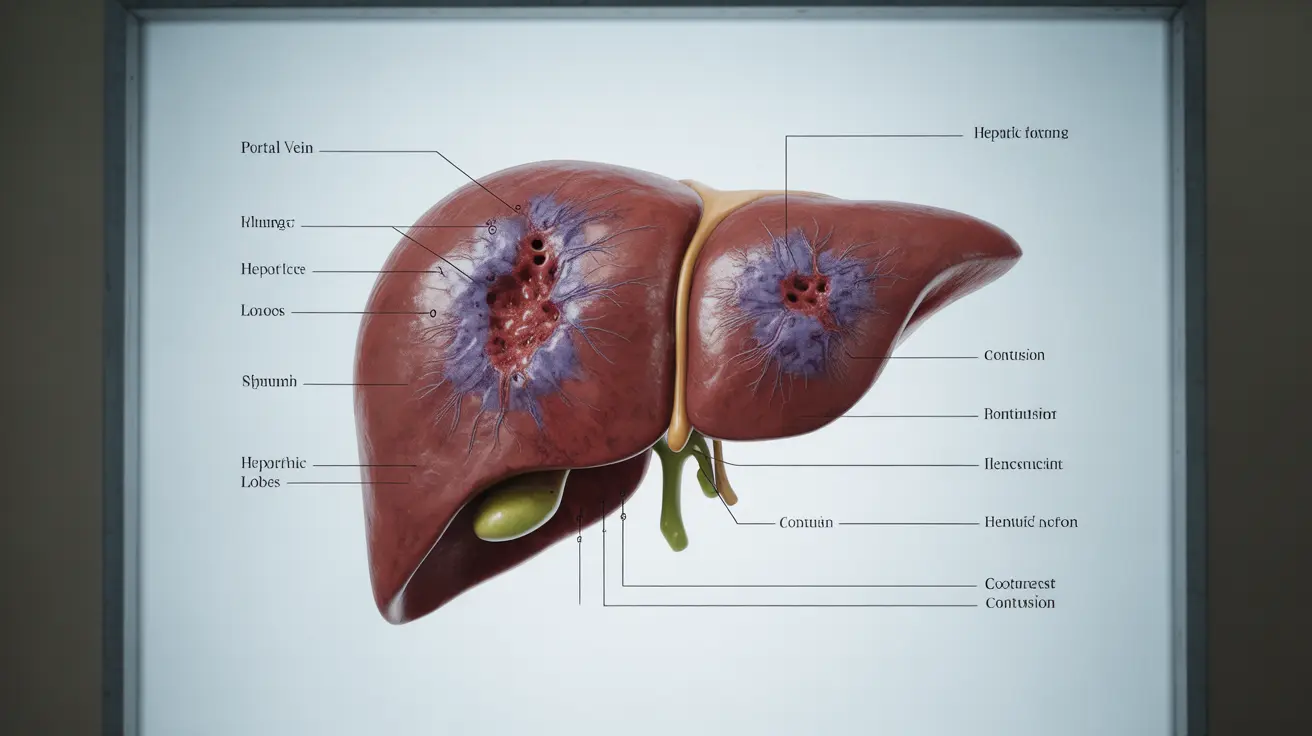A bruised liver, also known as a liver contusion, is a serious injury that requires prompt medical attention. This condition occurs when trauma causes damage to the liver tissue without creating an open wound. Understanding the signs, causes, and proper treatment of a bruised liver is crucial for anyone who has experienced abdominal trauma or is caring for someone who has.
While liver injuries can be severe, many cases can be managed effectively with proper medical care and follow-up. This comprehensive guide will help you understand what to look for, when to seek help, and how to support recovery from a liver contusion.
Understanding Liver Contusions and Their Impact
The liver is the largest internal organ and plays vital roles in metabolism, detoxification, and protein production. When the liver experiences trauma, it can become bruised or damaged, affecting its ability to function properly. The severity of a bruised liver can range from mild tissue damage to life-threatening complications.
Signs and Symptoms to Watch For
Recognizing the symptoms of a bruised liver is essential for seeking timely medical care. Common indicators include:
- Right-sided abdominal pain or tenderness
- Pain in the right shoulder (referred pain)
- Abdominal swelling
- Nausea and vomiting
- Weakness or fatigue
- Pale skin or sweating
- Rapid heartbeat
Common Causes of Liver Contusions
While vehicle accidents are a leading cause of liver contusions, several other situations can result in this injury:
- Contact sports injuries
- Falls from heights
- Direct blows to the abdomen
- Workplace accidents
- Bicycle or motorcycle accidents
Diagnostic Process and Medical Assessment
Healthcare providers use various methods to diagnose and evaluate liver contusions:
Physical Examination
Doctors will check for tenderness, swelling, and other physical signs of injury.
Imaging Tests
- CT scans
- Ultrasound imaging
- MRI (in some cases)
Laboratory Tests
Blood tests help assess liver function and identify potential complications:
- Liver enzyme levels
- Complete blood count
- Coagulation studies
Treatment Approaches and Recovery
Treatment for a bruised liver depends on the severity of the injury:
Conservative Management
Many cases can be treated without surgery through:
- Bed rest and activity modification
- Pain management
- Regular monitoring
- Dietary adjustments
Surgical Intervention
Surgery may be necessary for severe cases involving:
- Extensive tissue damage
- Internal bleeding
- Associated organ injuries
Home Care and Recovery Guidelines
During recovery from a bruised liver, patients should:
- Follow prescribed rest periods
- Avoid strenuous activities
- Maintain a healthy diet
- Attend all follow-up appointments
- Monitor for warning signs
- Avoid alcohol consumption
Frequently Asked Questions
What are the main symptoms of a bruised liver and when should I worry?
The main symptoms include right-sided abdominal pain, shoulder pain, nausea, and weakness. Seek immediate medical attention if you experience severe abdominal pain, dizziness, rapid heartbeat, or notice bruising around your abdomen after trauma.
How is a bruised liver diagnosed and what tests do doctors usually order?
Doctors typically diagnose a bruised liver through physical examination, CT scans, ultrasound imaging, and blood tests measuring liver enzymes and blood count. These tests help determine the extent of injury and guide treatment decisions.
What are the most common causes of a bruised liver besides car accidents?
Common causes include contact sports injuries, falls from heights, direct blows to the abdomen during physical activities, workplace accidents, and bicycle or motorcycle accidents.
Can a bruised liver heal on its own or is surgery always required?
Many bruised livers can heal on their own with proper rest and medical monitoring. Surgery is typically only required in severe cases involving significant bleeding, extensive tissue damage, or complications affecting other organs.
What should I do at home to help recover from a bruised liver, and when do I need to go back to the hospital?
At home, focus on rest, follow dietary restrictions, avoid alcohol, and take prescribed medications. Return to the hospital immediately if you experience increased pain, fever, vomiting, dizziness, or notice yellowing of the skin or eyes.




